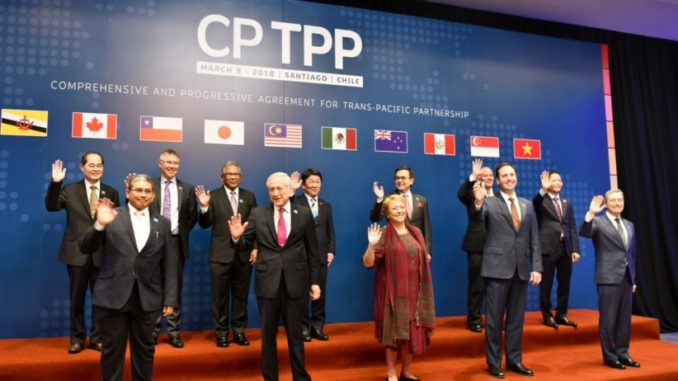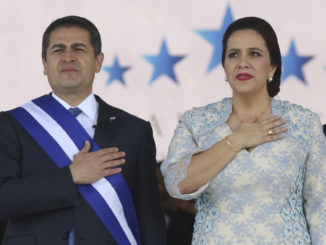
SANTIAGO – Trade ministers from 11 Pacific Rim countries Thursday signed a sweeping free trade agreement in Chile to streamline trade and slash tariffs.
The new Comprehensive and Progressive Agreement for Trans-Pacific Partnership (CPTPP), also known as TPP-11, was the result of negotiations that took place in 2016 involving 11 countries: Australia, Brunei Darussalam, Canada, Chile, Malaysia, Mexico, Japan, New Zealand, Peru, Singapore and Vietnam.
Trump withdrew the U.S. from the Trans-Pacific Partnership last year, causing fears that it would not prosper without its most influential country. But the remaining 11 members pressed ahead, saying they were showing resolve against protectionism through global trade.
The renegotiated pact signed in Chile’s capital was also renamed the Comprehensive and Progressive Trans-Pacific Partnership, or CPTPP.
Chile ?? is already a part of the Comprehensive and Progressive Treaty of Trans-Pacific Partnership (#CPTPP)! Check here ? some images of this important milestone that occurred in our country ???????????????????? pic.twitter.com/GKDhoVd4xu
— Chile MFA ?? (@ChileMFA) March 8, 2018
“Despite the diverse and difficult challenges, the CPTPP is a historic achievement that creates free and fair 21st century rules in the Asia-Pacific region,” Japanese Economy Minister Toshimitsu Motegi said a news conference after the signing of the deal.
The original TPP would have represented roughly 40% of the world’s economic output. Without the U.S. which was taken out of the deal by President Donald Trump, the new pact will cover just 13% of global GDP, but still include around 500 million people.
Its success highlights the isolation of the U.S. under Trump’s protectionist rhetoric on trade and his “America first” philosophy.
The U.S., originally the biggest TPP economy, was one of the trade deal’s strongest supporters before Trump took office. Trump has said he prefers country-to-country deals and is seeking to renegotiate several major trade agreements, including the North American Free Trade Agreement that includes the U.S., Mexico and Canada.
This is “a strong sign against the protectionist pressures, and in favor of a world open to free trade, without unilateral sanctions and the threat of trade wars,” Chilean Foreign Minister Heraldo Munoz said.
NOW: Chancellor @HeraldoMunoz signs, representing Chile??, the Comprehensive and Progressive Treaty of Trans-Pacific Association (#CPTPP) #TPP11 ? pic.twitter.com/8QkiocGMo9
— Chile MFA ?? (@ChileMFA) March 8, 2018
“China did not participate in the CPTPP Agreement. However, China has always been a staunch supporter of trade liberalization and an important participant in Asia-Pacific regional cooperation and economic integration,” China’s foreign minister, Wang Yi, commented Thursday on the deal at a news conference.
“Of course, we also hope that the various free trade arrangements in the Asia-Pacific region will be able to communicate and coordinate with each other and form a benign interaction, playing a constructive role in their respective fields in resisting trade protectionism and building an open world economy.”
The pact, which will significantly cut import taxes on a variety of products and services traded among these countries, is being criticized by Australian unions and leftist parties Chile and New Zealand for infringing on their respective national sovereignty.
Protests in Chile as 11 countries set to sign new TPP trade agreement
Dozens of people protested on Wednesday in Chile where the signing of the new Trans-Pacific Partnership Agreement (TPP) will take place in the country’s capital.
No to modern slavery, no to the TPP-11 – and – The TPP and TPP-11 are the same!? were among the statements written on banners carried by the Chilean demonstrators, who protested against the new TPP agreement in the area between the Defense Ministry and La Moneda Palace, headquarters of the Chilean government.



